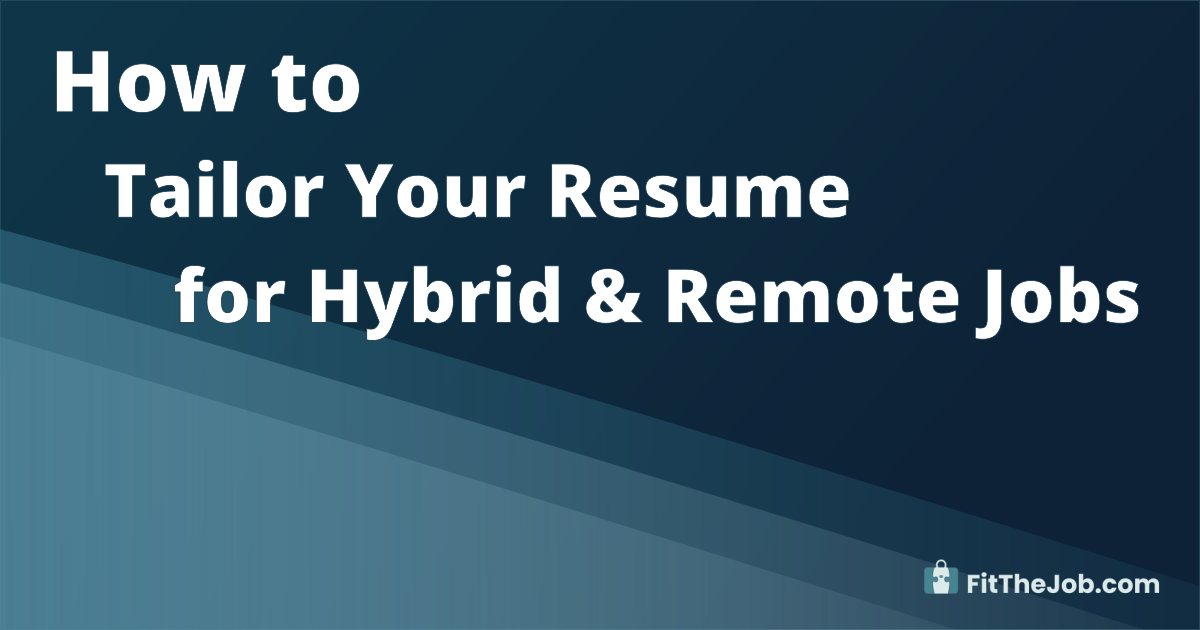How to Tailor Your Resume for Hybrid & Remote Jobs
Learn how to write a remote job resume that highlights hybrid role skills, communication, and results so you stand out as the ideal candidate.

Remote and hybrid jobs are no longer a temporary trend -- they’re a permanent fixture in the modern workforce. Employers across industries are looking for professionals who can thrive in distributed environments, collaborate across time zones, and maintain productivity without direct supervision.
If you want your resume to stand out for remote or hybrid opportunities, you need to signal more than just your qualifications. You need to highlight how you work -- the skills, tools, and habits that make you effective in a flexible workplace.
In this article, we’ll break down what to emphasize when writing a remote job resume, along with practical tips to showcase hybrid role success.
Why Remote and Hybrid Roles Require a Different Resume Approach
Traditional resumes often focus on technical expertise, leadership, and industry accomplishments. While those elements still matter, recruiters for remote and hybrid positions also screen for:
- Self-management: Can you work independently without constant oversight?
- Communication: Are you clear, concise, and reliable when collaborating virtually?
- Tech fluency: Do you know the tools that enable remote work?
- Adaptability: Can you switch between in-office and remote settings without losing momentum?
If your resume doesn’t demonstrate these qualities, you risk being overlooked, even if your background is impressive.
1. Highlight Remote Work Skills Explicitly
Hiring managers shouldn’t have to guess whether you can handle a distributed environment. Create a section in your resume (labeled Skills & Expertise) that explicitly lists remote work skills, such as:
- Virtual Collaboration & Communication
- Time Zone Coordination
- Digital Project Management
- Self-Directed Work Planning
- Proficiency with remote tools (Zoom, Slack, Microsoft Teams, Asana, Trello, Jira)
Fast Resume Advice: Use phrasing that matches job descriptions. For example, if the posting says “experience with hybrid team collaboration,” echo that exact language. This increases your chances of getting found in applicant tracking system (ATS) scans.
2. Showcase Experience With Remote or Hybrid Teams
If you’ve worked remotely in the past, weave that context into your professional experience bullets. Instead of simply saying:
“Led weekly project meetings for software development team.”
Upgrade it to:
Facilitated weekly virtual project meetings with a distributed team across three time zones, maximizing alignment on milestones and deliverables.
Even if the role wasn’t fully remote, you can highlight hybrid aspects:
Coordinated with on-site and remote engineers to deliver cloud infrastructure upgrades on schedule.
This demonstrates that you’ve already adapted to the realities of hybrid work.
3. Emphasize Results, Not Just Tools
While it’s helpful to list tools like Zoom or Asana, tools alone won’t get you hired. Employers want to see business outcomes tied to your remote or hybrid contributions. For example:
Reduced onboarding time by 30% by developing a virtual training module designed to increase accessibility across global regions.
Improved client satisfaction scores by implementing weekly video check-ins for remote accounts.
Eliminated delays in cross-functional workflows by introducing Slack channels for real-time collaboration.
By tying your remote work skills to measurable results, you show that you’re not just using the tools -- you’re creating value with them.
4. Demonstrate Communication Strength
Communication is the lifeline of remote work. Use your resume to show that you’re not just a contributor, but a connector. Strong communication bullets might look like:
Drafted clear, concise project updates for executives, reducing the frequency of status emails by 40%.
Standardized communication protocols across hybrid teams, increasing transparency while reducing duplicate work.
If you’ve created documentation, led webinars, or developed knowledge-sharing systems, mention those as well. They prove you’re proactive in keeping distributed colleagues aligned.
5. Underscore Time Management and Independence
Employers worry about accountability in remote roles. Your resume should proactively address that concern by demonstrating independence, reliability, and discipline. For example:
Delivered 15+ marketing campaigns independently while managing deadlines across overlapping client projects.
Balanced flexible hybrid schedule while maintaining 100% on-time project completion rate.
You don’t need to say “I’m good at time management.” Instead, use achievements that imply it.
6. Position Soft Skills as Core Assets
Soft skills are often harder to convey, but in remote and hybrid contexts, they’re essential.
Consider highlighting:
- Adaptability (navigating changing schedules or tools)
- Problem-solving (troubleshooting technical or process issues remotely)
- Initiative (taking ownership without being asked)
Use your Summary Section at the top of your resume to reinforce these qualities. For instance:
Project manager with more than 10 yeras of experience leading cross-functional hybrid teams. Builds trust through clear communication and drives the delivery of major projects in dynamic, distributed environments.
7. Don’t Forget the Basics: Clean, ATS-Friendly Layout
A common mistake is trying to overdesign resumes for remote jobs. Stick with a clean, single-column layout that avoids tables, graphics, or text boxes. Fancy design won’t help you land an interview -- in fact, it often hurts your chances when applicant tracking systems can’t parse the content.
Keep it professional, simple, and optimized for both bots and human readers. Strong writing + clean formatting always beats gimmicks.
Final Takeaway
Remote and hybrid opportunities are competitive, and employers want proof that you can deliver results outside a traditional office. The strongest remote job resumes emphasize:
- Remote work skills and tools
- Real achievements in distributed settings
- Clear communication and collaboration
- Independence, accountability, and adaptability
If your resume already highlights your expertise, tailoring it for remote or hybrid roles doesn’t require an overhaul. It’s about reframing your achievements to prove you’re ready for a flexible workplace -- one where performance matters more than presence.
✅ Want more tips on making your resume stand out? Check out our post on how to write resume achievements that get noticed.


